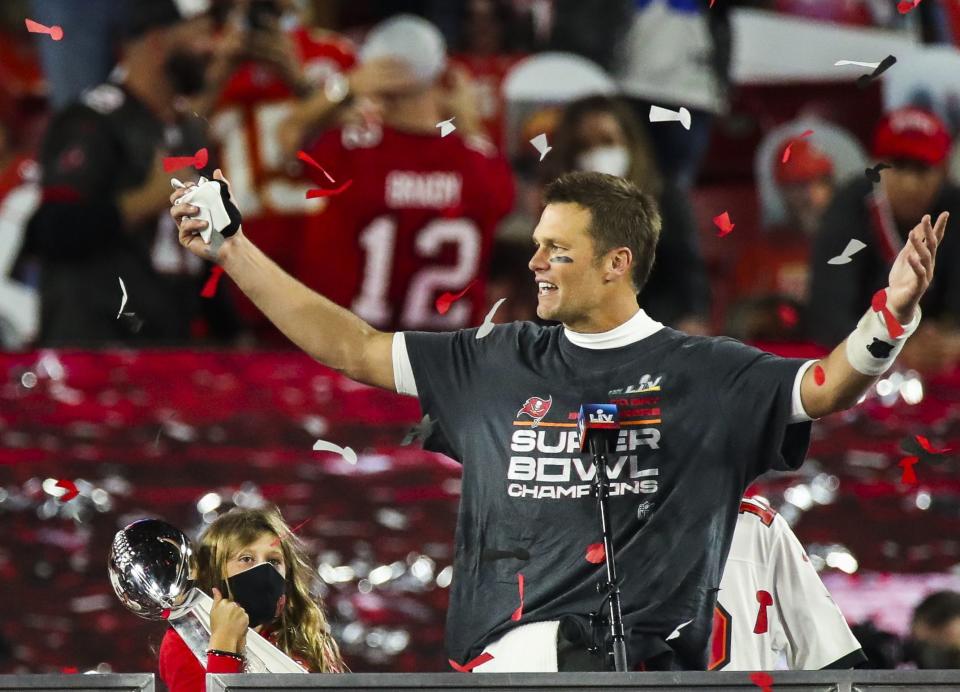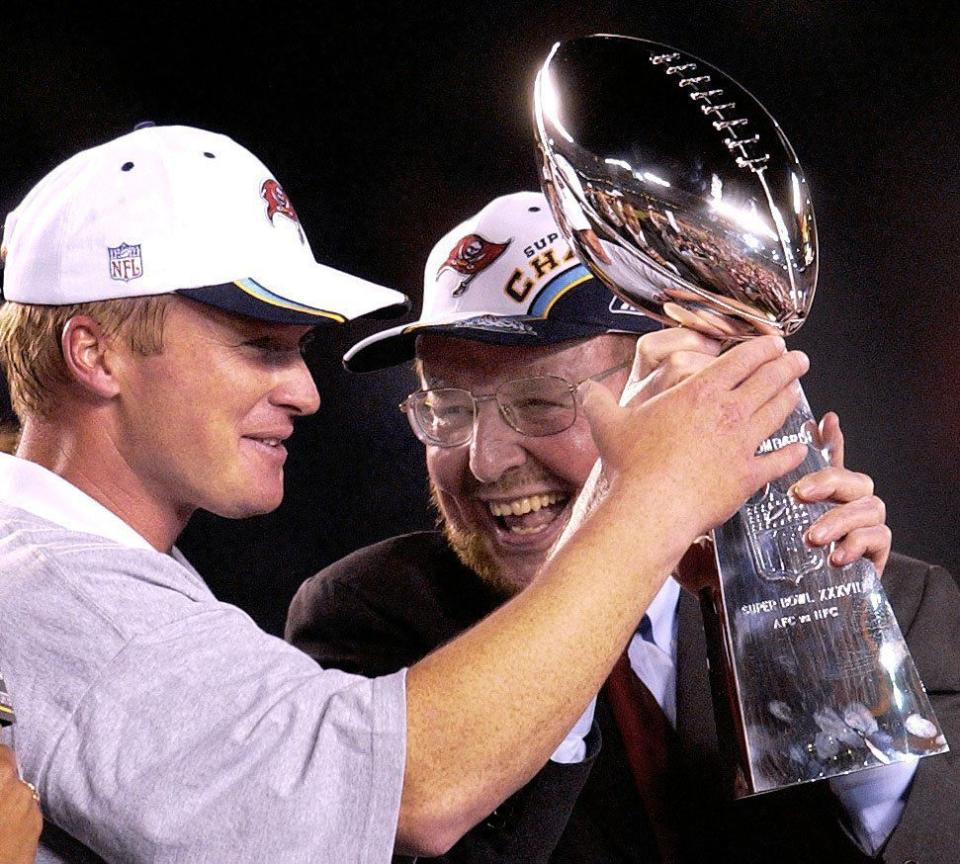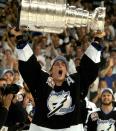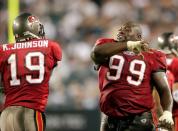Hey, Tampa Bay, let us know which sports trophy you love the most
TAMPA — In the days after triumph, reflection comes easily. We think of the journey, the signposts, the lessons. We recall the hardships and the heartbreaks. We acknowledge the blessings and cherish the memories.
And once the parades have ended and the confetti has been swept away, we hold on to this simple thought that helps carry us through our daily lives:
Up yours, Philadelphia.
You, too, Atlanta, Washington, Houston, Phoenix, Kansas City and Seattle.
For every city, every fan, every radio talk show host who has ridiculed the sports scene in Tampa Bay for decades, we have our big, foam index fingers held aloft this morning. Maybe a real finger, too.
This is what a Super Bowl title does for you. Not to mention a Stanley Cup and a World Series appearance. It means you no longer need to hear the snotty remarks from your Uncle Stan back home, or your sorority sister in her big-city high rise.
After playing the role of America’s sports jester for much of the 1970s, ’80s and ’90s, Tampa Bay has grown up in the 21st century. Four major sports titles in the past two decades, which is four more than we had before the new millennial arrived. (Yes, I know the Rowdies won the NASL Soccer Bowl in 1975, but it can’t really be considered the majors if the league folded a decade later.)
It’s also twice as many championships as they’ve seen in Philadelphia in the 2000s. Not to mention it’s more than Detroit, Dallas, Cleveland, Minneapolis, Denver, New Orleans and dozens of other big-league markets have won during that time.
We may not be strutting down the same red carpet as Boston, Los Angeles or San Francisco, but Tampa Bay’s trophy case looks pretty impressive considering our market size. Only Pittsburgh (five titles) and San Antonio (four) have had similar success without the benefit of having four or more teams in the major (NFL, MLB, NHL, NBA) sports leagues.
And that got me thinking:
Which one of Tampa Bay’s four major championships is the most impressive?
Which involved the hardest road? Which team was the most talented? For that matter, which was the least talented? Which team was the biggest surprise, and who did the greatest coaching job? Which got the most respect nationally?
Really, I guess what I’m asking: which of the four meant the most to you?
I’m curious whether the first titles — the Bucs Super Bowl season in 2002 or the Lightning’s Stanley Cup in 2004 — have a fonder place in your heart than the championships the Lightning and Bucs have won in the past six months.
Are you sentimental, or do you have a recency bias? Do you prefer Stamkos/Kucherov or Lecavalier/St. Louis? Sapp/Brooks or Brady/Gronkowski? I want to hear from you. Rank the four championship teams, and give me your thoughts at jromano@tampabay.com or on Twitter @romano_tbtimes.
To help you decide, here’s a recap of Tampa Bay’s championship seasons.
2002 Buccaneers
The prelude
From 1999-2001, the Bucs had the second-best record in the NFC at 30-18. They made the playoffs three consecutive seasons for the first time in franchise history, and had a defense that was already being measured alongside some of the best in history. Unfortunately, they were also 1-3 in the postseason and were changing offensive coordinators every season. The playoff disappointments finally led the Glazers to dismiss Tony Dungy as the head coach after the 2001 season with designs on hiring Bill Parcells. For the second time in 10 years, Parcells backed out at the last minute, leaving the Bucs scrambling. When they couldn’t get Steve Spurrier, GM Rich McKay was set to hire then-Ravens defensive coordinator Marvin Lewis. The Glazers said no. They wanted more offense, and they wanted a splash. A few weeks later, they sent two first-round picks, two second-round picks and $8 million to Oakland for coach Jon Gruden.
The regular season
Gruden’s offense was a slight upgrade in 2002, but that was not the reason the Bucs went 12-4 and won the newly created NFC South. This was the defense’s show, and it was a historic performance. The average NFL team gave up 21.7 points per game in 2002; the Bucs gave up 12.2. The only hiccups were a pair of losses to New Orleans, and some second-half injuries to quarterback Brad Johnson.
The postseason
It’s not an exaggeration to say this was one of the most dominant performances in postseason history. The Bucs briefly trailed Philadelphia 7-0 in the first quarter of the NFC Championship and were behind Oakland 3-0 in the first quarter of the Super Bowl, but otherwise dominated the playoffs. They won their three postseason games by a combined score of 106-37.
The stars
Three starters from that defense have already been voted into the Hall of Fame — Derrick Brooks, Warren Sapp and John Lynch — and a fourth – Ronde Barber — has an outside chance. Johnson, Mike Alstott and Keyshawn Johnson were the big names on offense, but the Bucs were slightly below average in scoring.
The aftermath
Hard to believe the group that walked off the field in San Diego after crushing the Raiders 48-21 in the Super Bowl never won another playoff game. Friction between Gruden and McKay led to the GM’s departure, and the defense noticeably declined. The legacy of that defense will never fade, but history doesn’t look kindly on a team going 12-20 after winning a Super Bowl. One interesting point: Assistant coaches Mike Tomlin, Raheem Morris, Rod Marinelli and Jay Gruden all went on to become NFL head coaches.
2003-04 Lightning
The prelude
By January of 2001, the Lightning had fired three head coaches in less than four full seasons. To the outside world, the franchise appeared to be a complete mess and that wasn’t entirely untrue. Up to that point, the Lightning had only one playoff appearance in nine seasons and a revolving door of owners, but the foundation for a turnaround was already in place. Future GM Jay Feaster joined the organization in 1998, along with draft picks Vinny Lecavalier and Brad Richards. Martin St. Louis signed as a free agent in 2000 and head coach John Tortorella was hired in early 2001. Over the next few seasons, Nikolai Khabibulin, Dave Andreychuk, Ruslan Fedotenko and Dan Boyle were added to the roster. The Lightning went from a 27-win season in 2001-02 to 36 wins and their first playoff series victory in 02-03. By the following season, they were the No. 1 seed in the Eastern Conference.
The regular season
Years later, it’s easy to recall 2003-04 as all goals and applause. That’s not exactly the way it went down. Tortorella was intent on building a culture of accountability and had been clashing with Lecavalier. By late December, he even briefly benched the No. 1 pick and in early January the Lightning had a pedestrian 16-16 record with six ties. The night after Feaster warned of potential personnel changes, the Lightning got hot and went 30-12 with five ties the rest of the way.
The postseason
Tampa Bay looked unbeatable in the first two rounds, cruising to eight wins in nine games against the Islanders and Canadiens. The next six weeks were anything but easy. The Lightning went to seven games before beating the Flyers in the conference final, then came from behind to wins Games 6 and 7 against the Flames in the Stanley Cup final.
The stars
While Lecavalier had been anointed a future star as a teenager, this was a coming-out party for St. Louis, who had gone undrafted and had never made an All-Star team at this point in his career. St. Louis led the NHL in scoring with 94 points and won the Hart Trophy as the league MVP. Richards, who played in the shadow of Lecavalier and St. Louis for most of the season, won the Conn Smythe Trophy with 12 goals in 23 playoff games. St. Louis and Andreychuk are in the Hockey Hall of Fame.
The aftermath
Labor strife wiped out the 2004-05 season and ended whatever hope the Lightning had of building a winning team for the ages. The new collective bargaining agreement led to Khabibulin’s departure, along with several other key players. It wasn’t until 2011 that Tampa Bay won another playoff series.
2019-20 Lightning
The prelude
Is there anything worse than being a bad hockey team that consistently finishes out of the postseason? Well, you could argue that it’s more painful to be a great hockey team that consistently breaks hearts in the postseason. Just ask the Lightning. There was not a more successful team in the regular season from 2013-14 to 2018-19. And the Lightning had their share of highs in the postseason too, reaching the conference final in 2016 and 2018 and the Stanley Cup final in 2015. But Tampa Bay could never quite get over the hump, and that stretch of frustration reached a crescendo in 2018-19 when its 62-win regular season was forever tainted after being swept in the first round of the playoffs by No. 8 seed Columbus.
The regular season
Like the year before when they were practically unbeatable, the Lightning had the best offense in the regular season in 2019-20. The difference was the defense had discovered a new grit. It didn’t show up every night in the regular season, but the Lightning were more interested in perfecting their style of play than padding their stats.
The postseason
The pandemic delayed the postseason for about four months, but it didn’t take the edge off the Lightning. Other than Game 1 losses to Boston and Dallas, they were in control most of the postseason. They took out the Blue Jackets and Bruins in five games each, and the Islanders and Stars in six games.
The stars
How much time do you have? Victor Hedman won the Conn Smythe. Nikita Kucherov was a year removed from the Hart Trophy, and Andrei Vasilevskiy has an old Vezina on his shelf. Time will tell, but Hedman, Kucherov and Stamkos could all be heading toward Hall of Fame careers.
The aftermath
The Lightning are already poised to have the best post-championship follow-up in Tampa Bay history. They lost a few complimentary pieces due to salary cap restrictions, but the core of the team remains the same and the Lightning figure to be a high seed in the upcoming postseason.
2020 Buccaneers
The prelude
In the 17 seasons after their first Super Bowl, the Bucs won 107 games. That works out to an average record of 6-10 for, basically, an entire generation of fans. There were coaching changes, quarterback changes, philosophical changes. The only thing that didn’t change was the result. Until, that is, Bruce Arians was hired in the winter of 2019. Arians brought a certain swagger and, with a hot hand from general manager Jason Licht, a new look to the roster. The decision to chase and sign 43-year-old quarterback Tom Brady before the 2020 season will go down as one of the shrewdest moves in NFL history.
The regular season
Because of his age, the Brady signing was an all-or-nothing bet for Tampa Bay. And for a good portion of the regular season, that bet did not look too promising. The pandemic had wiped out the preseason and made it challenging for Brady to adjust to a new offense and teammates. The Bucs did okay with weak teams, but struggled against playoff-bound opponents. It wasn’t until early December, after a bye week, that Tampa Bay seemed to get its act together on the way to an 11-5 record.
The postseason
Few teams have ever encountered such a difficult road to the Lombardi Trophy. As a wild card, the Bucs had to play three consecutive road games just to reach the Super Bowl. Along the way, they beat the Nos. 1, 2 and 4 seeds in the NFC. And when they reached the Super Bowl, they faced defending champion and AFC No. 1 seed Kansas City. It wasn’t even close. The Bucs routed the Chiefs 31-9.
The stars
There is no bigger star in the NFL, and most of the world, than Brady. He’s a shoo-in for the Hall of Fame. So is Rob Gronkowski. Seven years into his career, Mike Evans is putting together a Hall of Fame resume. Ndamukong Suh will have a decent argument and Lavonte David has been criminally overlooked for most of his career.
The aftermath
One month later, the Bucs seem confident about keeping this group together but signing David, Shaquil Barrett, Chris Godwin, Suh and Gronkowski could be a difficult task.










